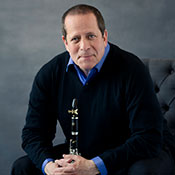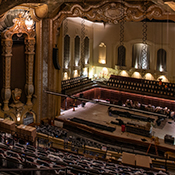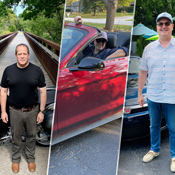
Principal Clarinet Todd Levy on Danielpour’s Clarinet Concerto
David Lewellen
PUBLISHED
Tagged Under: 2024.25 Season, Clarinet, Classics, MSO Musicians
Todd Levy prepared for his upcoming solo with the Milwaukee Symphony by listening to Rev. Dr. Martin Luther King Jr.
There’s a good reason. Levy, the orchestra’s principal clarinet, is performing From the Mountaintop by Richard Danielpour, a piece written in honor of the civil rights leader’s memory. “The clarinet plays the preacher, and the orchestra is like a gospel choir, call and response, back and forth,” Levy said. The piece occupies the middle position of the orchestra’s all-American program Feb. 21-22.
When he first studied the written clarinet part, Levy thought, “This could go in so many directions. I need some guidance.” So he found recordings of several of King’s sermons — including the one he gave the night before his death, referenced in the title, when he said, “I’ve been to the mountaintop … and I’ve looked over and I’ve seen the promised land. I may not get there with you, but I want you to know tonight that we as a people will get to the promised land.”
“I hadn’t listened to that in quite a few years,” Levy said. “I’d forgotten how he spoke, and the variety of ways he spoke. Sometimes he was very emotional, sometimes he was laying the groundwork, but everything was right to the point.”
He continued, “It’s a very sad speech, in a way. And the piece is very powerful. Danielpour’s music is always beautifully written and meaningful. As a performer, you have to put yourself out there. It’s an emotional journey to play it. You feel the weight of the subject matter.”
The middle movement of the concerto is actually an extended cadenza for the clarinet, accompanied only by the timpani — meant to suggest the thunderstorm outside while King gave his mountaintop speech. On some recordings, Levy said, the thunder is faintly audible in the background. He and the MSO’s principal timpanist, Dean Borgesani, will be meeting soon to practice the passage together. Before the first full orchestral rehearsal, they will meet with Music Director Ken-David Masur, who will conduct the concerts. “We need someone to organize the freedom between those two parts,” Levy said.
Levy has been a frequent soloist with the MSO since he arrived in 2000, but his last such appearance was in 2020 — the last weekend before the pandemic shut everything down. “The orchestra changes,” he said. “I like to solo when I can, when there’s a piece that makes sense. We have a lot of great new musicians, and it’s good to feature those people.”
From the Mountaintop has been on Levy’s radar for several years, and it fits in well with the other pieces on the program by Aaron Copland and Charles Ives. Levy has known Danielpour, the composer, for many years, and he said, “I can call and ask if there’s something I don’t get.” In fact, the two of them did talk about the piece last summer, after the concert details had been finalized. “I think very warmly of his music,” Levy said. “He’s one of the few composers that I think anything he writes will be good.”
In fact, he added, we are in a good period for new clarinet concertos. “Clarinetists are commissioning new works, and the repertoire is expanding,” he said. “There’s a lot of new music for future generations.” He compared it to the mid-20th century, when jazz legend Benny Goodman commissioned solo works from Copland, Stravinsky, and Hindemith.
But the life of the soloist was something Levy decided against. “That’s a special niche within a niche,” he said. “It’s a very tough career.” For a few years when he was younger, he spent most of his time traveling as a soloist and with a woodwind quintet. “It was a great experience and it strengthened my musicality,” he said, “but I couldn’t do it long-term, the mentality of always being on the road and always being exposed.”
Levy has found that for him, it’s a better balance to sit in the orchestra most weeks. But the MSO benefits from having its members perform as soloists sometimes. “Audiences love to see the people they see every week step out front,” he said. “We need that energy and emotional attachment with the audience.”



